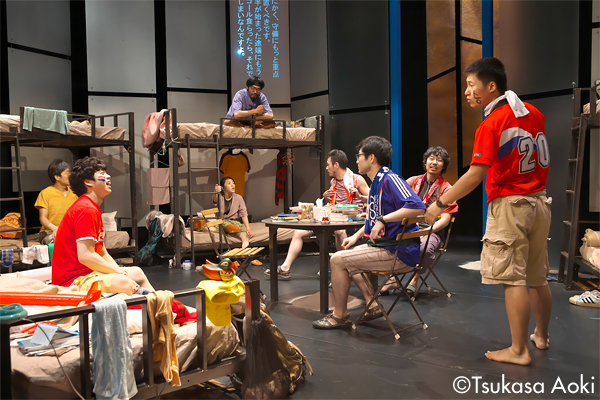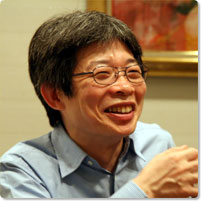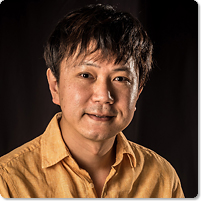
Kings of the Road 2002
(Jun. 12 – 29, 2015 at Kichijoji Theatre) Photography: Tsukasa Aoki
Data
:
Premiere: 2015
Length: 2 hr., 10 min.
Cast: 16
Shin-Boken O (Kings of the Road 2002)

Born in Tokyo in 1962, Oriza Hirata is a playwright and director and the leader of the theater company Seinendan. He is also the artistic director of the Komaba Agora Theater in Tokyo and artistic director of Kinosaki International Arts Center. He is a specially appointed professor of the Organization for COI at the National University of the Arts, Tokyo, a visiting professor and special counsel to the president of Shikoku Gakuin University, a visiting professor at the Kyoto Bunkyo University, he is president of the Theater Professional Conference of the Japan Performing Arts Foundation, manager of the Fujimi Municipal Hall Kirari Fujimi, a director of the Japanese Society for Theatre Research, a director of the Japan Foundation for Regional Art Activities, a cultural policy advisor for Toyooka City, and a director of the Nagi Town Education, Culture and Community Development committee.
At the age of 16 Hirata took a leave from high school and set off to travel around the world by bicycle, eventually riding through 26 countries worldwide over the course of 18 months. In 1984, he graduated from the Liberal Arts School of the International Christian University in Tokyo. During his time at the university he formed the Seinendan theater company. In his Junior year at the university, Hirata got a scholarship to study abroad at South Korea’s Yonsei University for one year.
He won the 39th Kishida Kunio Drama Award for playwriting with Tokyo Notes in 1995, after which he won many prizes up until 2019, when he won the 22nd Tsuruya Nanboku Drama Award for History of the Rise and Fall of Japanese Literature . In 2006, he won the Montblanc de la Culture Arts Patronage Award. In 2011, he was awarded the L’Ordre des Arts et des Letters of the French Ministry of Culture.
Oriza Hirata has been one of the key figures in the contemporary theater scene in Japan with his “contemporary colloquial theater theory.” He has actively undertaken many collaborative productions abroad, in countries including France, South Korea, China. From 2008 to 2013, he served as chairman of the Japanese committee for the BeSeTo theater festival. Also, at his public small-theater Komaba Agora Theater he has pursued the education and nurturing of young theater makers. He has also achieved notable achievements in the areas of communication education through theater and theater instruction at the university level. Through his activities as artistic director at public theaters and publications like his book Geijutsu Rikkoku Ron (Arts as the Basis of a Nation, 2002) and other efforts, he has remained an opinion leader in the field of public policy concerning the arts and culture at the national and local government levels.
Seinendan website:
http://www.seinendan.org/eng/

Born 1974. Playwright, director, leader of the 12th Tongue Theater studio.
While studying Korean Language and Korean Literature at Yonsei University, Sung spent one year studying Japanese on an exchange program with the Korean department of Tokyo University of Foreign Studies in 1999. After returning to Korea he did graduate studies at the Korea National University of Arts’ School of Drama.
In 2006, Sung debuted as a playwright and director with his play Private Third Class. In addition to his activities as a writer and director, Sung was also active in multiple roles as a translator, interpreter, directing assistant and producer in the world of Japanese and Korean theater. Working in collaboration with Japanese director Junnosuke Tada of Tokyo Deadlock, he created the plays Karumegi (2013) and Taifu Kidan (2015). Among his works as a translator are the three-volume collection of selected plays of Oriza Hirata, titled Collected Plays of Oriza Hirata, and he has co-translated and published [Oriza Hirata’s] For Contemporary Colloquial Theater, and published Collected Plays of Yoji Sakate,: The Attic.
In 2011, Sung’s production of Kagakusuru Kokoro – Mori no Oku Hen (The Scientifically Minded – Deep in the Forest Edition) based on the play by Oriza Hirata won the Excellent Drama award of the 4th Korean National Theater Grand Prix; in 2012, he won the Best Director award of the 1st Seoul Theater Grand Prix for a production of Too much love, too many; in 2013, Sung’s play Karumegi won the Best Play, Best Director and Best Visual and Sound Design awards of the 50th Dong A Play Awards; and in 2014, he won the 4th Doosan Artist Award and the Young Artist Award of the Ministry of Culture, Sports and Tourism.

Kings of the Road 2002
(Jun. 12 – 29, 2015 at Kichijoji Theatre) Photography: Tsukasa Aoki
Data
:
Premiere: 2015
Length: 2 hr., 10 min.
Cast: 16
The setting is June 18th, 2002, when the jointly held Japan-South Korea Football World Cup is in progress. The place is an inexpensive inn in Istanbul, Turkey used by young people of many different nationalities. The stage is a room being shared by backpackers from Japan and South Korea. Conversations go on in Japanese and Korean as well as broken English.
Both Japan and South Korea have made it through the round robin to the tournament stage, and on the same day both teams have been playing games that will determine whether or not they progress to the quarterfinals. Right now, Korea is playing against Italy, and Korea is losing 0 – 1. Japan has already lost out to Turkey earlier in the morning. The Koreans have gathered down in the hotel’s lobby where there is a television, so the only ones left in the room are the Korean [woman] So Yeon, who is reading a book by Orhan Pamuk, and three Japanese men, the older Hajime Sawada, Kota Kinoshita, who has been backpacking since he graduated from college, and Takashi Ueki, who is always sleeping. Among both the Korean and Japanese men are ones who are in love with her.
Two Japanese, Sayuri Maekawa and Naoto Soejima, return to the room and begin talking about the “Doha Tragedy” when in 1993 the Japanese national team lost their chance to compete in the World Cup in the last minutes of an Asian qualifying game against Iraq in Doha. Seul Gi, the hotel’s customer tout tells them that for the Koreans it was the “Doha Miracle,” because when Japan lost to Iraq, South Korea got the last Asian spot in the World Cup that they had all but given up hoping for. At the time, Sayuri was a college student right in the middle of the “hiring freeze” after Japan’s economic bubble burst and companies stopped hiring college grads and she was biding her time backpacking around the world, and Seul Gi was an elite company employee in Korea.
When the Korea-Italy game enters halftime, the Koreans who had been watching the game down in the lobby and the Japanese woman Ikumi Yajima (girlfriend of the Korean man Myeong Hwan, whose will soon begin his mandatory two years of military service back in Korea) return to the room. Min-jae, who will be leaving the hotel soon, and Myeong Hwan are talking about the game. As the time for the second half approaches, Min-jae invites the Japanese to come and cheer for Korea with them, but they decline the offer. Sawada says it will be too bad if both Korea loses like Japan did and both fail to move on in the tournament.
The Japanese in the room enter into a discussion with Takahiro Kim (a 3rd-generation Korean-Japanese) and the older Korean man Infu about what country Japan could play against that would make them want to root for Japan. Infu answers that he would never root for Japan, no matter who the opponent was. He feels ambivalent about the fact that Turkey, a country that sent an army to fight along with the South Koreans in the Korean War also has a good relationship with Japan historically. Ikumi brings up the subject of the South Korean mandatory military service for men, and Infu, who has served his two year in the military, says that when he was serving, he just waited for the time to go by.
Min-jae, Myeong Hwan and Ikumi go back down to cheer for Korea in the second half of the game. After a while, Seul Gi comes back bringing with him Kathy, an Armenian-American who is good at Japanese. Kathy says she was surprised that Japan and South Korea decided to hold the World Cup together. For Kathy, the [bad] historical relationship between Japan and Korea reminds her of the relationship between Armenia and Turkey, a country that killed many Armenians during the World War I.
Hajime mutters that he had been planning to travel east across the Eurasian continent to return home to Japan, but after the 9.11 terror attacks in the U.S. it was no longer possible to cross through Afghanistan and Pakistan. One year ago at the time of the 9.11 attacks, Naoto had been working part-time at a convenience store to save up money to travel, Hajime had been taking a nap in Nairobi, and for Kathy it had been early morning in San Francisco.
Hideo Sakamoto returns to the hotel from town, where everyone is celebrating Turkey’s victory over Japan. Ikumi reports that Korea has tied up their game with Italy and everyone goes down to the lobby to watch the rest of the game, leaving just So Yeon and Hideo, who has feelings for her, together in the room alone.
The second half ends with the teams still tied. There is a break before the start of the extended time periods. The excited Koreans pour into the room. The Japanese join in their cheer calls and Arirang chorus, filling the room with a noisy frenzy. Then they leave the hotel to go to a local gathering spot for Koreans to cheer with them.
The only ones left in the room are Infu and So Yeon. When Infu says that he can’t understand why the Japanese, who are usually so quiet in nature, could invade Korea and now act like they don’t remember anything about it. So Yeon replies that Koreans are quick to get excited about things but also quick to forget the excitement afterwards.
His mother Hee Kyung has come to bring Myeong Hwan back to Korea, where he soon has to enter the armed services, and at the same time, So Yeon has packed up her things and disappears without telling anyone. When Takeshi tells Hee Kyung that Ikumi is Myeong Hwan’s girlfriend, it starts an uproar. Higeong and others go out in search of Myeong Hwan. In the lobby Italians are in an uproar about their team’s loss to South Korea.
Kathy comes in bringing a girl named Pomi who likes Japanese manga and anime and wants to learn Japanese. Pomi likes bananas and takes one out of her bag and begins to eat it. Hajime and Hideo are puzzled by the fact that Infu and Pomi aren’t excited about Korea’s victory. Pomi says that she doesn’t dislike football but she dislikes the World Cup. Kathy leaves the room to go register for her lodging.
Hajime says that he doesn’t know whether he wants to return to Japan but he does want to see the Genkai-nada Sea from Pusan. Infu replies that he will invite Hajime to his home in Gwangju. Then he suggests that before Hajime goes to see across the Genkai Sea to Japan from Pusan, why don’t they go and see Asia from Istanbul. The four in the room decide that they will go to the bazaar to buy bananas and then go to the Galata Bridge to look across the straits to Asia.
Takeshi is looking at a Korean conversation book and practicing speaking broken Korean: “Where do you want to go?” Pomi says, “to the sea,” Infu says, “Home.” Then Pomi says, “Do you want to eat bananas?” and passes some around. Then they all begin eating.
Related Tags